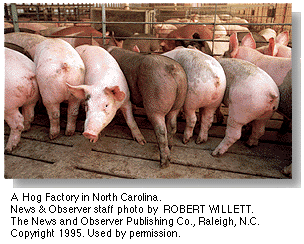Corporate Hog Factories: The Real Results
by Rhonda Perry
Columbia, Missouri
Family Farmers are being forced off their land ...
 Traditionally, hogs have been raised on small to medium-sized farms as a means of providing a stable cash flow to farm families while using a limited amount of resources. In recent years, there have been revolutionary changes in the methods of hog production. Now, hogs are frequently raised on farms that are significantly larger and are owned by vertically-integrated corporations. In 1993, 45% of the pork market share was controlled by the four largest corporations. Traditionally, hogs have been raised on small to medium-sized farms as a means of providing a stable cash flow to farm families while using a limited amount of resources. In recent years, there have been revolutionary changes in the methods of hog production. Now, hogs are frequently raised on farms that are significantly larger and are owned by vertically-integrated corporations. In 1993, 45% of the pork market share was controlled by the four largest corporations.
Large corporate-owned hog operations and family farmers use very different methods in hog production. Corporate hog operations keep thousands of hogs in a small building, where they are fed, watered and cleaned by automated equipment. Because this method requires less time and labor, it may appear to be a more "efficient" way of increasing hog production. However, while it may increase profits for large agribusinesses - family farmers, rural communities, animals and the environment are suffering.
Because the prevalence of corporate hog farms has led to an increase in the numbers of hogs produced, the market price for hogs has decreased. Smaller farmers are receiving lower income from their hogs and they do not have the capacity to increase production and compete with larger farms. Many small farmers have been forced to give up their hogs and their farms. In the last twenty years the number of hogs produced in the U.S. has increased by 3 million. Simultaneously, the cost of hogs has dropped to a record low of $25 per hundred. Meanwhile, two thirds of all hog producers have been lost.
Corporate hog factories build their own processing plant and thus control the hog market. They only buy hogs from their own production facilities. As a result, smaller independent farmers have lost their access to the markets and have no place to sell their hogs.
Faced with the challenges of corporate control and the struggle to meet their expenses, small family farmers are faced with a decision. Do they leave the land? Or do they enter into a contract agreement with one of these large corporations and give up their independence in order to survive?
According to the U.S. Department of Agriculture, small hog producers with less than 100 head in their herds account for 62%, of all hog producers. Yet they account for less than 6% of the nation's hog inventory. Hog producers with 500 head or more make up only 12% of the nation's hog producers. Yet they control 68% of the nation's total hog supply.
Rural communities are being destroyed ...
When large corporations move into rural areas, small family farmers are squeezed out. Every low-wage job created by large hog factories puts three independent family farmers out of business.
The loss of small family farmers jeopardizes the entire economy of rural communities. Small farmers show smaller debts, use less energy and spend more money locally. A Virginia study that compared corporate hog operations to independent producers found that independent producers generated 10% more permanent jobs, 20% larger increase in local retail sales, and a 37% larger increase in local per capita income. Finally, because of the odor they generate, large hog factories cause the devaluation of land values.
The environment is being devastated ...
 In large hog factories, animals are being raised in inhumane conditions. Thousands of hogs are confined inside a small enclosed building without any exposure to sunlight or outside air. These factories also give off ammonia-based fumes which contaminate the air. This foul odor lowers the quality of air and attracts insects. In large hog factories, animals are being raised in inhumane conditions. Thousands of hogs are confined inside a small enclosed building without any exposure to sunlight or outside air. These factories also give off ammonia-based fumes which contaminate the air. This foul odor lowers the quality of air and attracts insects.
Because these large hog factories use man-made lagoons to dispose of the hog waste, they may contaminate the water supply. The waste from the lagoons may leak into the ground water. A study of swine operations in 18 states revealed that more than 13% of the nearby drinking water had nitrate levels exceeding federal standards. Nitrates are known to cause death in infants. Plants and wildlife in the surrounding areas have been killed as a result of polluted waterways.
Rhonda Perry is program director of the Missouri Rural Crisis Center. The MRCC's headquarters are in Columbia, Missouri and Rhonda Perry commutes to the MRCC office from the farm she lives and works on near Armstrong, Missouri.
Photo of Rhonda Perry by Nic Paget-Clarke.
|



 Traditionally, hogs have been raised on small to medium-sized farms as a means of providing a stable cash flow to farm families while using a limited amount of resources. In recent years, there have been revolutionary changes in the methods of hog production. Now, hogs are frequently raised on farms that are significantly larger and are owned by vertically-integrated corporations. In 1993, 45% of the pork market share was controlled by the four largest corporations.
Traditionally, hogs have been raised on small to medium-sized farms as a means of providing a stable cash flow to farm families while using a limited amount of resources. In recent years, there have been revolutionary changes in the methods of hog production. Now, hogs are frequently raised on farms that are significantly larger and are owned by vertically-integrated corporations. In 1993, 45% of the pork market share was controlled by the four largest corporations. In large hog factories, animals are being raised in inhumane conditions. Thousands of hogs are confined inside a small enclosed building without any exposure to sunlight or outside air. These factories also give off ammonia-based fumes which contaminate the air. This foul odor lowers the quality of air and attracts insects.
In large hog factories, animals are being raised in inhumane conditions. Thousands of hogs are confined inside a small enclosed building without any exposure to sunlight or outside air. These factories also give off ammonia-based fumes which contaminate the air. This foul odor lowers the quality of air and attracts insects.